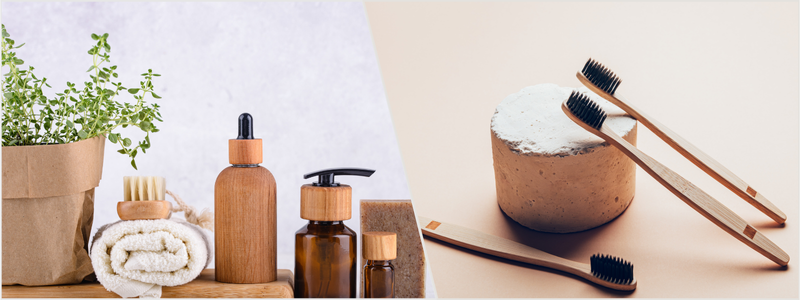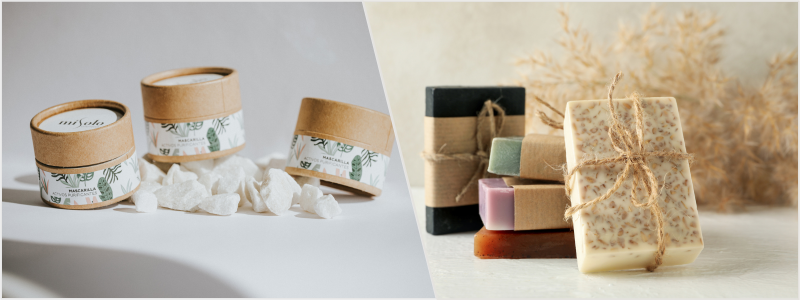The last few years have put the beauty industry under a great deal of serious scrutiny. Beauty and cosmetic companies are also dealing with the mounting pressure to become more sustainable and eco-friendly, from the specific ingredients used in their products to their manufacturing process and how they ship the products to customers. This is why there is now a high demand for beauty and cosmetic packaging designs that are designed for sustainability.
 Table of contents
Table of contents
What is sustainability?
Before getting into the nitty-gritty of design details of cosmetic packaging design services, first, it’s important to know the working definition of sustainability and how beauty and cosmetic companies can create designs aligned with this. While there are numerous strategies and variations on how companies approach the concept of sustainability, there are several overarching features that make packaging designs sustainable. For starters, the packaging must be 100% natural or recycled materials with an eco-friendly production process.
RELATED: Open innovation for more sustainable products
It means the need for a well-managed and ethical supply chain. The package’s production must also be in a closed-loop or zero-waste way for the packaging to be considered eco-friendly and sustainable. Second, it should also be easy for the customers to upcycle, reuse, or recycle the packaging in some form. It’s extremely important to remember that for most beauty and cosmetics companies, it can be tricky to integrate all these elements into a single package while trying to keep the price points at reasonable levels for customers.
This is the reason why it’s important to set priorities for the values of the company as far as eco-friendliness is concerned and to focus on it while the packaging designer designs sustainable packaging for beauty and cosmetics products. For instance, although beauty companies can’t always produce the most eco-friendly packaging for lotions since bottles are mostly produced using plastic, the secret here is to make a resolute effort in the right direction.
The ultimate goal here is to make the packaging as eco-friendly as possible to protect the planet and still offer customers the value they deserve. The following are some of the best sustainable options for your beauty and cosmetic packaging designs:
RELATED: What are the benefits of sustainable manufacturing?
Bamboo packaging
Bamboo is an up-and-coming trend in eco-friendly packaging for cosmetic and beauty businesses. This is suitable for disposable packages such as lipstick or lip balm cases. Bamboo is among the best choices for plant-based cosmetic packaging because it uses completely renewable sources. Pesticides or insecticides are not used to cultivate and grow bamboo. Different species are also available to give companies lots of options to choose from.
Bamboo is also a lightweight option for packaging, with its sheath adding an extra durability layer to cosmetic containers. Bamboo is highly recommended as a biodegradable alternative to paper and plastic because its wood is ideal for external jars that use glass or acrylic as an inner coating. Cosmetic jars made from bamboo can also be branded using different techniques such as engraving, hot stamping, screen printing, and more.

Beeswax packaging
Beeswax is another excellent and intriguing sustainable material for beauty and cosmetic packaging concept design firms. This can be easily manipulated and molded which makes it an excellent layer of protection to serve as a cover or surround items. Beeswax packaging, as its name suggests, is made from beeswax, coconut oil, and jojoba oil paired with a coating in the form of cotton that resembles fabric. Beeswax is an excellent substitute for plastic that allows more unique opportunities for branding.
RELATED: Sustainable product design tips for a healthy world
Beeswax packaging also comes in various patterns and colors and is a cheaper option compared to other sustainable packaging options for beauty and cosmetics products. Beeswax can also benefit cosmetics thanks to its distinct characteristics. The material has antibacterial elements that offer outstanding protection while being durable enough to keep the products safe from damage.
Cornstarch packaging
Cornstarch is an ideal substitute for plastic for beauty and cosmetic companies looking for an eco-friendly and more organic packaging option for lotion bottles. This type of packaging is made from PLA or polylactic acid derived from renewable sources like sugarcane or cornstarch. Although there are concerns regarding supply chains if this is more extensively used, options are still available to integrate this packaging alternative into overall operations.
Cornstarch as a viable replacement for plastic offers numerous possibilities as far as sustainable packaging options are concerned. It is recyclable and biodegradable at the same time, which makes it a great option for skincare cream jars and lotion bottles. Cornstarch is non-toxic and doesn’t produce huge quantities of emissions, which is why more and more companies are now turning to cornstarch as an ideal packaging alternative.
RELATED: Sustainable product design and product development principles for firms to consider
Paper packaging
For the longest time, packaging design firms used paper as an eco-friendly packaging material in various industries, including the beauty and cosmetics industry. There are various ways to use this kind of sustainable packaging as an alternative to plastic. Lipstick and makeup packaging, for example, usually includes plastic filling like bubble wrap for added protection.
Using paper fillers made of recycled or cardboard paper as a replacement for plastic fillers is a great substitute to achieve more sustainable packaging for your company. Paper is biodegradable and renewable at the same time to offer a more sustainable protection alternative to single-use plastics.
Post-Consumer Recycled (PCR) packaging
Post-consumer recycled (PCR) packaging is one of the most popular choices for eco-friendly packaging. It has quickly gained famed with projections revealing that the industry is expected to grow into several billion dollars soon. This type of packaging is produced using recycled items like paper, cardboard boxes, aluminum, plastic bottles, and other common materials. Once these recyclables reach a recycling facility, they are separated according to materials and sorted into bales. These bales are bought and molded to produce new items.

RELATED: Sustainable packing design tips for new products at your firm
It results in a solution with a plethora of capabilities in terms of the size and shape of the packaging produced, making it an ideal choice for beauty and cosmetics companies that want to pursue the initiative of using 100% recycled materials. What sets PCR packaging apart from other recyclable or compostable packaging options is the fact that it is made after sending the raw materials to recycling facilities. Reusing the materials gives them a new life.
On the other hand, with recyclable and compostable packaging, customers dispose of the packages, ending their lifecycle. Compostable and recyclable packaging also greatly relies on the disposal process of the customer because some conditions may change the biodegradability of the material. PCR packaging is often chosen over compostable and recyclable choices for beauty and cosmetics packaging and containers because of the different advantages it offers for customers and companies alike.
It is also among the most accessible eco-friendly options for beauty packaging since it can be easily shaped into various sizes and forms, which makes it an ideal option for items such as lotion bottles or cream jars. The following are some of the key advantages of PCR packaging:
- Flexibility
- Good strength
- Protection
- Alternative for plastic film
- Reduced carbon footprint
- Strong barrier performance
PCR packaging is also beneficial as it helps beauty companies showcase and maintain eco-friendly initiatives through sustainable packaging. As modern customers become more conscious about the environmental effects of materials like plastic, PCR packaging is an excellent way to engage with the target market about environmental impact and sustainability without compromising the quality of the product packaging.
RELATED: Effective cosmetic packaging design tips for new cosmetic products companies & firms
Refillable packaging
One of the biggest challenges in the beauty and cosmetics industry is reducing the use of plastic in traditional skincare and lotion packaging. However, with only a few waterproof and durable options available, beauty companies are trying to reach compromises to reduce the effects of abundant plastic use in items like cosmetic jars and lotion bottles. The best way to achieve this is to encourage customers to reuse the containers by offering refill services.
Refillable cosmetic packaging helps companies lessen their environmental impact while engaging with customers and establishing product value. This allows companies to dramatically reduce the impact of plastics and at the same time, encourage customers to continue reusing and returning the product. Companies can also provide special discounts for customers who use refill services to encourage the extended and continuous use of their containers. While plastic itself is not eco-friendly, constant reuse is an outstanding compromise for sustainable packaging options.
Seaweed packaging
Seaweed, on paper, may not sound like a possible option for sustainable packaging but it offers lots of potential for new concept design & product development companies. Seaweed packaging is dissolvable and edible which makes it an ideal option for biodegradable packaging. While seaweed is more commonly used in the food industry, it also offers lots of exciting benefits for the beauty industry. Seaweed is a great substitute for eco-friendly skincare packaging for gels, lotions, face masks, and other types of general liquid-based cosmetic products.
RELATED: Top 20 packaging design blogs for freelance product designers
Seaweed packaging also serves as a great alternative to plastic because it is an abundant resource without negative effects on the environment. Although the innovation is currently in the prototyping stage, the general idea here is to freeze the seaweed, thaw it, and then air-dry it to transform it into a packaging material. It produces a transparent film, packaging, or cushioning that can be further reinforced with other types of natural materials like fiber or algae for extra protection.
How Cad Crowd can help
Check out the Cad Crowd platform to find the best companies that can come up with sustainable packaging designs for your beauty and cosmetic products.
